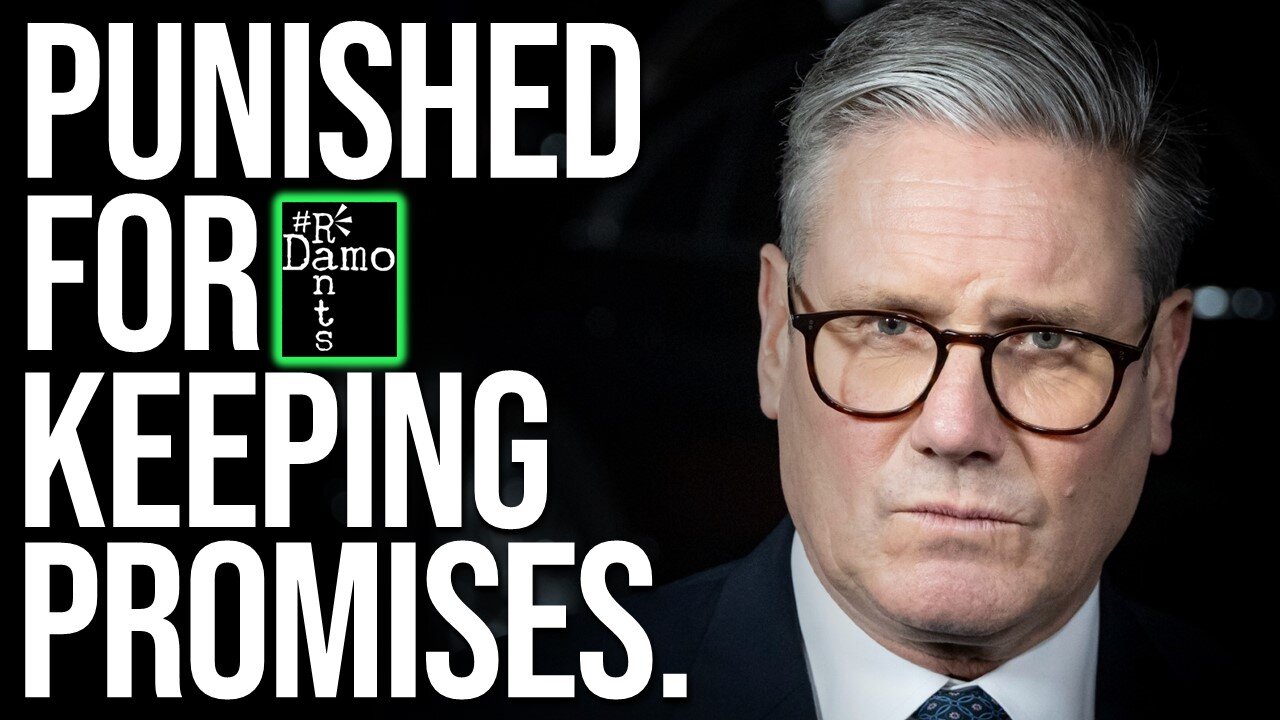Premium Only Content

Starmer Tried to Crush Dissent – But Proved He’s Losing Control
Right, so in Keir Starmer’s Labour, loyalty to voters has now become rebellion. Keeping manifesto promises is now a punishable offence. The suspension of four MPs and the dismissal of three respected trade envoys for opposing welfare reforms exposes a leadership more concerned with enforcing personal obedience to Starmer himself than with honouring the commitments that brought Labour to power last year. Starmer breaks his word constantly, now he punishes those who don’t go along with that. It raises profound questions about Labour’s identity, its future direction, and Britain’s credibility both at home and abroad.
Who, then, are the real rebels? Are they the MPs and envoys who defended Labour’s promise to protect the vulnerable, or is it Starmer himself, who has shifted the party’s policy away from the platform he stood for election on, for social justice and toward yet more Tory-style austerity? And what does it say about Britain’s global reputation that Starmer is willing to jeopardise trade goodwill in Ghana, Pakistan, South Africa, and Mauritius simply to reinforce his authority at home?
This purge does not stand in isolation of course either. It follows Starmer’s suspension of seven MPs last year for opposing his refusal to scrap the two-child benefit cap, a decision that kept hundreds of thousands of children in poverty and generated widespread backlash against him and his front bench. Far from learning from that debacle, Starmer has repeated the same mistake, doubling down on punitive discipline that, far from projecting strength, shows his petty vindictiveness and weakness, revealing his deep political insecurity and a fear of debate when he knows he’s the rebel every time he breaks yet another promise.
Right, so yesterday, Keir Starmer suspended four Labour MPs—Rachael Maskell, Neil Duncan-Jordan, Brian Leishman, and Chris Hinchliff—perhaps not exactly household names, but they are amongst the small bunch of decent Labour MPs still in the party after Starmer made sure his party was mostly full of loyal drones. They were of course suspended after they defied the party whip to vote against the government’s welfare reform bill. The reforms were a central plank of Starmer’s fiscal strategy, designed to save an estimated £5 billion annually by tightening eligibility for disability and long-term sickness benefits. They were far from the only MP’s to rebel on this of course, so to excuse suspending this handful, as a warning to others not to vote against him, God forbid they be allowed to represent their constituents before party, these MPs were labelled as not just dissenters; they were key organisers of a rebellion to force the government to drop some of its harshest proposed cuts.
The purge did not stop there though. Three trade envoys—Rosena Allin-Khan, who had been representing South Africa and Mauritius; Bell Ribeiro-Addy, who was trade envoy to Ghana; and Mohammad Yasin, who held the same role for Pakistan—were stripped of their posts too. These envoy positions are unpaid but they re significant, representing Britain in trade discussions and building relationships critical for global economic strategy. The decision to remove them was widely interpreted as retaliatory much as those suspensions were. Although they retained the Labour whip, the message was clear: any act of disobedience, even on a domestic moral issue, would have consequences. But there are consequences for Starmer here too, which I’ll come on to in a moment.
Starmer’s leadership justified these actions as necessary to maintain discipline and ensure that Labour’s large Commons majority could deliver its legislative programme. That this was about “showing who’s in charge” and proving that “persistent rebellion has consequences.” But this was not party discipline in defence of the voters’ mandate; it was personal authority being enforced at the expense of the very principles Labour had promised to uphold.
Whether these MPs and envoys were genuine rebels depends on how you define rebellion here actually. If rebellion means betraying the party’s voters and its 2024 manifesto, then it is Starmer, not the MPs, who has broken ranks. Labour’s election campaign promised to reduce disability poverty, protect those most in need, and ensure no one would be left behind due to disability or illness. It did not promise to cut existing support or tighten eligibility for Personal Independence Payment (PIP) or Universal Credit in ways that would impoverish hundreds of thousands of disabled people.
The government’s reforms aimed to reassess hundreds of thousands of claimants, pushing many into lower-rate benefits or into low-paid, part-time work. The Resolution Foundation projected that once reassessments were completed, up to 300,000 disabled and long-term sick people could lose between £50 and £120 a month, pushing many below the poverty line. The Institute for Fiscal Studies estimated that one in five disabled households could see a reduction in their monthly income. This is a direct contradiction of Labour’s stated aim of reducing disability poverty.
The MPs who rebelled understood this contradiction. Rachael Maskell, Neil Duncan-Jordan, Brian Leishman and Chris Hinchcliff all took the position of saying they they voted for the values Labour was elected on, not to make disabled people poorer.
These were not ideological provocateurs or factional warriors. They were MPs acting in line with the principles Labour campaigned on, defending voters’ expectations rather than Starmer’s post-election pivot. If anyone is rebelling against Labour’s mandate, it is Starmer himself, who has reinterpreted vague pledges about “making work pay” as a green light for Treasury-led austerity.
The three trade envoys were similarly acting in good faith. Their rebellion was not motivated by factional disloyalty either but by a commitment to protect vulnerable people. Their removal had nothing to do with their performance in their roles and everything to do with sending a political message: loyalty to Starmer is now valued more highly than loyalty to Britain’s voters or Britain’s diplomatic relationships.
Starmer’s heavy-handed response raises massive questions about his leadership style. Is this the behaviour of a strong leader confident in his vision, or of a weak one insecure in his authority and lashing out? The evidence points to the latter doesn’t it? A leader secure in his convictions persuades his party and wins the argument politically. Starmer’s reliance on purges suggests he lacks either the confidence or the moral authority to debate openly. He’s out of his depth.
This is not an isolated incident either as we well know. Last year, Starmer suspended seven MPs for defying him over the two-child benefit cap, a policy that kept around 250,000 children in poverty. Again, its standing up for some of the most vulnerable n society, that Starmer chose to punish his own MPs over. That episode sparked grassroots anger and accusations that Labour was abandoning its commitment to social justice and so here we go again. Instead of learning from that backlash, Starmer has repeated the same mistake, punishing MPs for acting on conscience in defence of the vulnerable.
The optics are hugely damaging. Labour is once again seen to be punishing its own MPs for opposing poverty. This reinforces the perception that Starmer prioritises Tory style Thatcherite economics over social justice, aligning Labour closer to the Blairite positions of the late 1990s and early 2000s and the economic woes that ongoing privatisation, PFI style agreements had over traditional Labour values. Yet even Tony Blair allowed more space for conscience votes on moral issues such as Iraq or welfare reform, he didn’t purge his internal critics, he allowed for it. Historically, Labour has tolerated dissent on issues of principle; Starmer’s approach suggests a shift toward a presidential, leader-centred party where loyalty to him personally outweighs loyalty to the party’s values and certainly loyalty to the the people of this country they are supposed to represent. If you have a Labour MP, you are represented less now as a result.
Paradoxically, it may be that Starmer’s large Commons majority may have made him more anxious to maintain total control, fearing that any sign of weakness could embolden backbenchers. Rather than trusting his majority, he has chosen to govern through fear. But authoritarian discipline does not signify strength; it just exposes a leader’s lack of moral confidence.
If suspending MPs for defending the vulnerable was politically foolish, sacking trade envoys for the same vote was diplomatically reckless. These envoys were not figureheads; they were actively building relationships crucial to Britain’s post-Brexit trade strategy.
Rosena Allin-Khan had been strengthening energy and investment ties with Mauritius and South Africa, work praised by local officials and covered positively on official government channels. Bell Ribeiro-Addy was warmly welcomed in Ghana, where her cultural diplomacy and diaspora connections were widely reported and celebrated. Mohammad Yasin had been cultivating strong trade links with Pakistan, praised by the Pakistani High Commission and covered in Arab News and Geo News as a sign of Britain’s renewed interest in South Asia.
By removing them for a domestic vote unrelated to their diplomatic work, Starmer sent a particularly damaging message. It suggests that UK trade envoys are political appointees who can be removed at the whim of party politics, undermining trust in Britain’s reliability as a trade partner. In the Global South, where personal relationships and continuity matter, this risks eroding goodwill that takes years to build. At a time when the UK is attempting to reposition itself as a global trading power, this is self-inflicted idiocy because Starmer’s ego is a little bit hurty.
The welfare rebellion underscores a deeper truth: Starmer is abusing the mandate Labour received in 2024. Labour was elected on a platform of fairness and social justice. Starmer’s post-election shift to fiscal conservatism represents a bait-and-switch. By prioritising Treasury savings over manifesto promises, he has effectively rewritten the terms on which Labour was given power. He’s the rebel therefore and he’s rebelled against all of us.
Starmer is steering the party away from its social democratic roots and toward a technocratic, centrist model, becoming ever more right wing, closer to the New Labour era and even surpassing it—one that prioritises economic “credibility” over moral credibility. But breaking trust with voters on such fundamental issues as welfare undermines Labour’s claim to moral authority. If Labour cannot be trusted to protect the disabled, can it be trusted on housing, education, or healthcare?
Public trust is not the only casualty. Grassroots members and trade unions are increasingly alienated. The MPs and envoys punished by Starmer are viewed by activists not as rebels, but as being true to Labour’s mandate and roots. They are seen as defending Labour’s soul against a leadership that has quite clearly abandoned it.
Internally, it risks deepening factional divisions. The Socialist Campaign Group and other left-leaning MPs may now feel emboldened to challenge Starmer – chance would be a fine thing with that lot though - seeing that his leadership depends more on fear than persuasion. Grassroots members, far more likely to act if I’m honest, already frustrated by his lurch to the right, may become even less willing to campaign, weakening Labour’s ground game in future elections, when their support has already nosedived.
Electorally, Starmer’s betrayal of core social justice promises will alienate working-class voters, disabled voters, and families who believed Labour would protect them. Polling already shows growing scepticism among key demographics that Labour is committed to fairness. Starmer appears even more untrustworthy, not only to left-leaning voters but to everyone who believes in something frankly, he lacks any consistency and integrity. He believes in nothing he seems, an absolutely soulless, vapid, empty suit of a man.
Internationally, the fallout from the trade envoy dismissals could damage Britain’s reputation as a reliable diplomatic partner. In countries like Ghana, Pakistan, and South Africa, where personal trust and relationship-building are vital, Starmer’s actions could be interpreted as a snub. If trade partners believe UK appointments are unstable and politically contingent on how loyal they are to Starmer personally, they may look elsewhere for more reliable alliances and I wouldn’t blame them.
Keir Starmer’s purge of MPs and trade envoys is more than an internal Labour dispute. It is a defining moment for his leadership and for Labour’s identity. This is what he’s becoming known for, a Henry VIII style leader, who runs the party basically through tyranny. By punishing MPs for defending Labour’s manifesto and sacking envoys respected abroad for an unrelated domestic vote, Starmer has betrayed his party’s values, weakened his moral authority, and trivialised UK diplomacy.
The four suspended MPs and three dismissed envoys are not rebels. They are Labour loyalists, upholding the promises voters believed in. The real rebellion is happening in Downing Street, where Labour’s 2024 mandate is being dismantled in favour of neoliberal orthodoxy. Starmer may believe these purges project authority, but they instead expose weakness, insecurity, and a fear of debate.
A leader secure in his convictions persuades; a leader unsure of his moral authority purges. If Starmer continues down this path, he will continue to alienate the very voters and activists who delivered his landslide, undermining Britain’s international credibility, and reducing Labour to little more than a machine for enforcing personal loyalty. If Corbyn were still leader at this point he’d have faced half a dozen leadership challenges by now, why is it the Labour right are so content to head towards electoral oblivion like this? In Keir Starmer’s Labour, the greatest crime is no longer disloyalty to the leader—it is loyalty to the promises that brought the party to power.
Speaking of Corbyn though, he might have just sealed Starmer’s fate somewhat, insofar as the setting up of a new party goes, which has elicited much by way of accusations in the mainstream media of Corbyn being a Farage enabler by splitting the left vote. As if Starmer’s Labour is left wing! He’s the biggest Farage enabler going as he copies Reform policies incessantly, so this narrative is backfiring and you can get all the details of that in this video recommendation here as your suggested next watch.
Please do also hit like, share and subscribe if you haven’t done so already so as to ensure you don’t miss out on all new daily content as well as spreading the word and helping to support the channel at the same time which is very much appreciated, holding power to account for ordinary working class people and I will hopefully catch you on the next vid. Cheers folks.
-
 2:18:46
2:18:46
Tucker Carlson
4 hours agoTucker Carlson Interviews Nick Fuentes
60.3K268 -
 LIVE
LIVE
Drew Hernandez
13 hours agoCANDACE OWENS CALLS CHARLIE KIRK STAFF INTO QUESTION?
1,267 watching -
 47:03
47:03
Barry Cunningham
6 hours agoPRESIDENT TRUMP MEETS WITH THE PRIME MINISTER OF JAPAN!! AND MORE NEWS!
30.8K21 -

Flyover Conservatives
22 hours agoThe Dollar Devaluation Playbook: Gold, Bitcoin… and the “Genius Act” - Andy Schectman | FOC Show
20.9K3 -
 LIVE
LIVE
SpartakusLIVE
6 hours agoWZ Tonight || Battlefield 6 BATTLE ROYALE Tomorrow!
278 watching -
 LIVE
LIVE
megimu32
3 hours agoON THE SUBJECT: Halloween Nostalgia! LET’S GET SPOOKY! 👻
49 watching -
 1:24:56
1:24:56
Glenn Greenwald
5 hours agoThe Unhinged Reactions to Zohran's Rise; Dems Struggle to Find a Personality; DHS, on Laura Loomer's Orders, Arrests UK Journalist and Israel Critic | SYSTEM UPDATE #538
105K60 -
 4:36:02
4:36:02
Spartan
5 hours agoBack from worlds. Need a short break from Halo, so single player games for now
19K -
 LIVE
LIVE
Eternal_Spartan
12 hours ago🟢 Eternal Spartan Plays FF7 Rebirth Episode 15 | USMC Veteran
77 watching -
 1:32:11
1:32:11
Tundra Tactical
4 hours ago $1.31 earnedProfessional Gun Nerd Plays Battlefield 6
16.1K